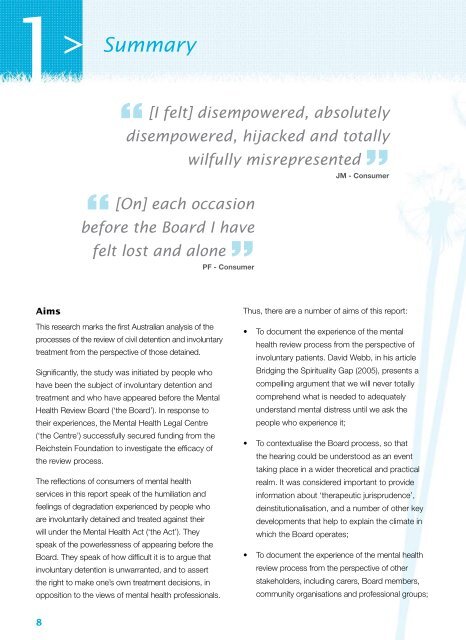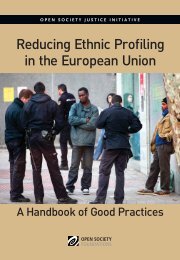Lacking Insight - Community Law
Lacking Insight - Community Law
Lacking Insight - Community Law
- No tags were found...
You also want an ePaper? Increase the reach of your titles
YUMPU automatically turns print PDFs into web optimized ePapers that Google loves.
1 > Summary“[I felt] disempowered, absolutelydisempowered, hijacked and totallywilfully misrepresented“[On] each occasionbefore the Board I havefelt lost and alone”PF - Consumer”JM - ConsumerAimsThis research marks the first Australian analysis of theprocesses of the review of civil detention and involuntarytreatment from the perspective of those detained.Significantly, the study was initiated by people whohave been the subject of involuntary detention andtreatment and who have appeared before the MentalHealth Review Board (‘the Board’). In response totheir experiences, the Mental Health Legal Centre(‘the Centre’) successfully secured funding from theReichstein Foundation to investigate the efficacy ofthe review process.The reflections of consumers of mental healthservices in this report speak of the humiliation andfeelings of degradation experienced by people whoare involuntarily detained and treated against theirwill under the Mental Health Act (‘the Act’). Theyspeak of the powerlessness of appearing before theBoard. They speak of how difficult it is to argue thatinvoluntary detention is unwarranted, and to assertthe right to make one’s own treatment decisions, inopposition to the views of mental health professionals.Thus, there are a number of aims of this report:• To document the experience of the mentalhealth review process from the perspective ofinvoluntary patients. David Webb, in his articleBridging the Spirituality Gap (2005), presents acompelling argument that we will never totallycomprehend what is needed to adequatelyunderstand mental distress until we ask thepeople who experience it;• To contextualise the Board process, so thatthe hearing could be understood as an eventtaking place in a wider theoretical and practicalrealm. It was considered important to provideinformation about ‘therapeutic jurisprudence’,deinstitutionalisation, and a number of other keydevelopments that help to explain the climate inwhich the Board operates;• To document the experience of the mental healthreview process from the perspective of otherstakeholders, including carers, Board members,community organisations and professional groups;8
















